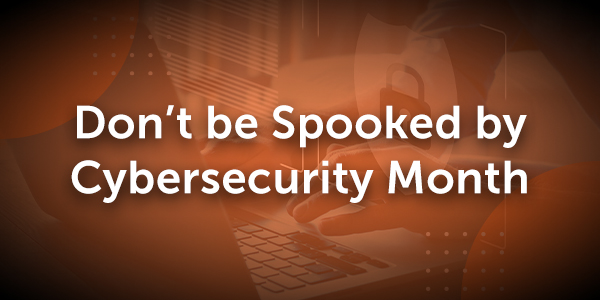
Don’t be Spooked by Cybersecurity Month
October 21, 2022
October is usually a spooky time of year, as everyone prepares for Halloween, and for us Mainers, winter (AHH!) The month is also eerie for another reason though, it is Cybersecurity Month! Although Cybersecurity itself isn’t spooky, the thought of falling victim to a cybercriminal certainly is.
So how do you avoid the numerous online scams that seemingly haunt everyone on the internet? By keeping up on the latest trends and identifying fraud before it ever has a chance to say “boo!”. Here are a few cybersecurity terms, what they mean, and tips on how to avoid them.
What is Social Engineering?
Social engineering is an art that cybercriminals use to get you to give them personal or financial information. Phishing, smishing and vishing are three of the most common forms of social engineering used to contact you by email, text or phone. Cybercriminals often even deceive, manipulate, or influence you to send them money through these techniques.
What is Phishing?
Phishing uses email to attempt to trick victims into clicking on fraudulent links. These links often take you to a seemingly legitimate form that asks you to type in their usernames, passwords, account numbers or other private information. This information is then sent directly to scammers, and you may have no idea until your information and money is stolen.
How Members Can Prevent Falling Victim to a Phishing Attack
- Know the warning signs – Poor grammar, threatening language, unrealistic promises, and unexpected attachments all qualify. If a message includes any of these signs, take extreme caution and assume you’re being targeted.
- Hover over links – Hovering your mouse over a link will display the full URL. It helps you spot malicious links. Even if a link appears safe, it can still be dangerous. Be absolutely sure before you click.
What is Smishing?
Smishing uses SMS (text messaging), instead of email and contains many of the same techniques found in typical phishing attacks. The fraudster claims a bank account has been compromised and asks you to immediately click on a link. Doing so could give a cybercriminal access to personal information or allow them to take over your banking and social media accounts.
How Members Can Prevent Falling Victim to a Smishing Attack
- Don’t trust messages that attempt to get you to reveal any personal information.
- Beware of similar tactics in platforms like What’s App, Facebook Messenger Instagram, etc.
- Treat messages the same way you would treat email, always think before you click!
What is Vishing?
Vishing uses phone calls and voicemail and often these attacks use an automated system that asks you to enter banking details. Some attacks will even connect you to a live scammer who will attempt to impersonate the credit union.
How Members Can Prevent Falling Victim to a Vishing Attack
- Do not respond to phone requests for personal financial information.
- If you are concerned, call us directly, using the phone number that appears on the back of your credit card or on your monthly statement.
- Speak only with live people when providing account information, and only when you initiate the call.
More CyberSecurity Resources
For more information including active cybersecurity alerts, helpful resources, and our online safety guide, please visit our Security Center page by clicking the button below.



